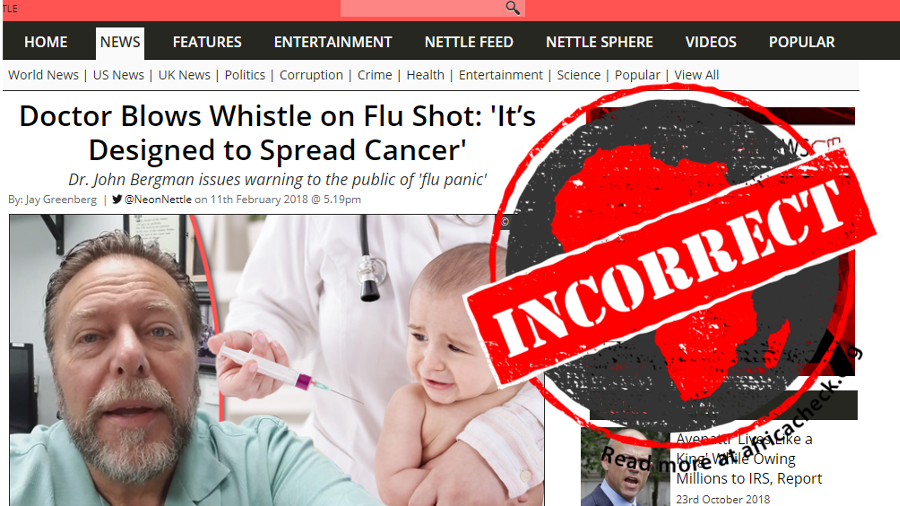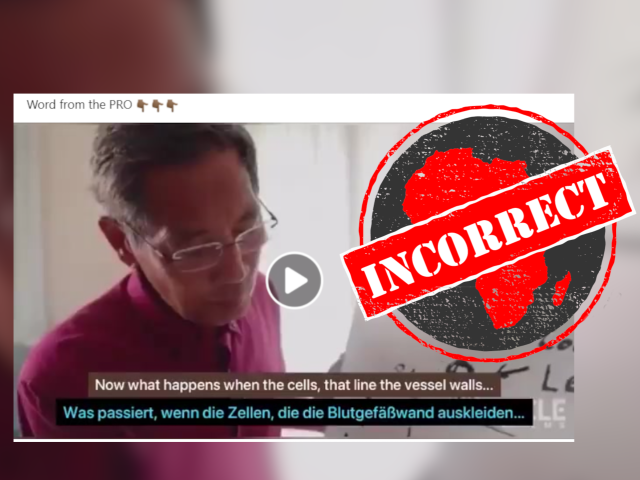An article claiming flu vaccines cause cancer has been racking up Facebook shares in Kenya.
First published in February 2018, the article on Neon Nettle claims a “top doctor” named John Bergman “has revealed the influenza vaccinations being used to combat the latest H3N2 strain are virtually ineffective and being forced onto the public through fear tactics to spread cancer”.

But this viral claim has already been debunked by other fact-checkers, including the US-based Politifact and Radio Canada, a Canadian public broadcaster.
In March 2018, Politifact unsuccessfully tried to contact Bergman. It also spoke to three experts who questioned the lack of evidence to back up the claim.
Politifact has placed Neon Nettle, which claims it is an independent news source based in the UK, on its list of known fake news sites.
Dr Sitna Ali, an oncologist at Aga Khan University Medical College in Nairobi, told Africa Check the claim was incorrect.
“The article is misleading and does not provide any evidence of how the flu vaccine causes cancer. There is no literature out there on the same,” Ali said.
But the problem remains that, in Kenya, anti-vaccine sentiment can often gain strong currency.- Vincent Ng’ethe (22/10/2018)
First published in February 2018, the article on Neon Nettle claims a “top doctor” named John Bergman “has revealed the influenza vaccinations being used to combat the latest H3N2 strain are virtually ineffective and being forced onto the public through fear tactics to spread cancer”.

Neon Nettle on Politifact’s fake news list
But this viral claim has already been debunked by other fact-checkers, including the US-based Politifact and Radio Canada, a Canadian public broadcaster.
In March 2018, Politifact unsuccessfully tried to contact Bergman. It also spoke to three experts who questioned the lack of evidence to back up the claim.
Politifact has placed Neon Nettle, which claims it is an independent news source based in the UK, on its list of known fake news sites.
No evidence of vaccine causing cancer
Dr Sitna Ali, an oncologist at Aga Khan University Medical College in Nairobi, told Africa Check the claim was incorrect.
“The article is misleading and does not provide any evidence of how the flu vaccine causes cancer. There is no literature out there on the same,” Ali said.
But the problem remains that, in Kenya, anti-vaccine sentiment can often gain strong currency.- Vincent Ng’ethe (22/10/2018)
Republish our content for free
For publishers: what to do if your post is rated false
A fact-checker has rated your Facebook or Instagram post as “false”, “altered”, “partly false” or “missing context”. This could have serious consequences. What do you do?
Click on our guide for the steps you should follow.
Publishers guideAfrica Check teams up with Facebook
Africa Check is a partner in Meta's third-party fact-checking programme to help stop the spread of false information on social media.
The content we rate as “false” will be downgraded on Facebook and Instagram. This means fewer people will see it.
You can also help identify false information on Facebook. This guide explains how.





Add new comment